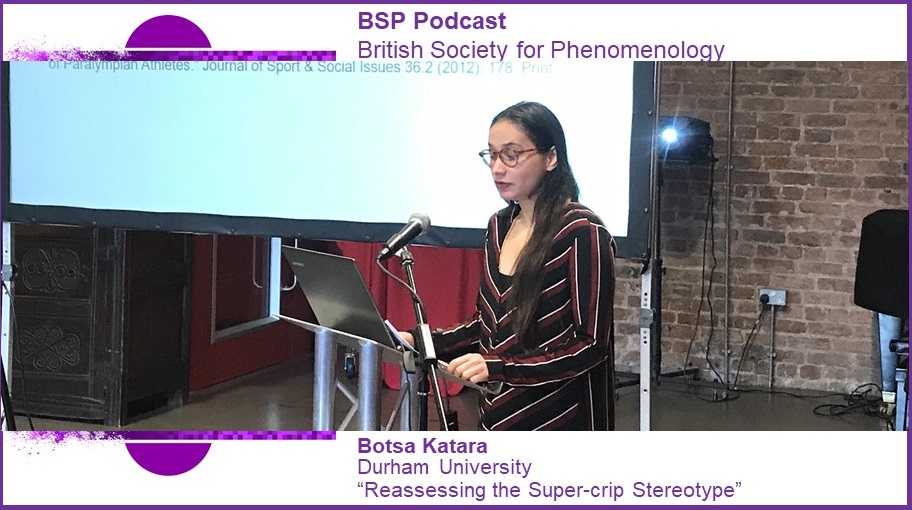The BSP Podcast continues with another presentation from our 2019 Manchester annual conference ‘The Theory and Practice of Phenomenology’ .
Season 4 episode 83: 25 July 2020
Season four of the BSP Podcast continues with a paper from Botsa Katara, Durham University. The recording is taken from our 2019 Annual Conference, ‘The Theory and Practice of Phenomenology’.
Botsa Katara: ‘Reassessing the Super-crip Stereotype’
You can listen to this episode on the BSP’s Podbean site, and you can also find it on iTunes and all good podcasting apps by searching ‘BSP Podcast’.
ABSTRACT: The term “super-crip” can be construed as a misleading twist on the derogatory term crippled. The latter signifies the dire condition of human frailty, limitations of embodiment, and a life without possibilities, while the latter is emblematic of overcoming those limitations to such a preposterous extent that not only demonises, and annihilates the experience of living with physical disabilities but also heralds an insidious discourse of superlative athletic vigour, and prowess. This paper aims to demonstrate that to reduce the body into a functional machinery which might be repaired and augmented is to disavow the intricate mechanisms of the body-mind connect that are orientated towards intentionality, affectivity, attunement, proprioception, and kinesthesis. Under the theoretical lens of Merleau-Ponty’s Phenomenology of Perception, Gallagher’s How the Body Shapes the Mind, and Carel’s Phenomenology of Illness, this paper shall analyse of the depiction of physical impairments in literary fiction, and memoirs. Following Carel’s conception of “epistemic injustice” it shall delineate the exigent need to incorporate felt experiences of disability in the wider cultural domain, thereby promulgating an informed and empathetic approach towards disability that adheres neither to the derogatory conception of the crippled nor the superhuman creation of the super-crip.

BIO: My name is Botsa Katara, second year PhD in English literature and Medical Humanities, from Durham University. My research focuses on the depiction of impaired movement in the literary works Beckett, Coetzee, and Kelmann. I am also looking at graphic memoirs, and life writings of amputees, and prosthetics that serve as counter narratives to the contemporary culture of the ‘super-crip’. I hold a Master’s degree in Modernity and Literature from the University of Edinburgh where my thesis focussed on identity conflict, desire, and domination in cancer patients. I have worked as a trainee at a prosthesis centre in New Delhi, India, where my work centered on closely observing young amputee rehabilitation.
The ‘British Society for Phenomenology Annual Conference 2019 – the Theory and Practice of Phenomenology’ was held at the International Anthony Burgess Foundation, Manchester, UK, 5 – 7 September, 2019.
Registration is now open for our 2020 annual conference: ‘Engaged Phenomenology’’ – the BSP Annual Conference, with the University of Exeter, co-sponsored by Egenis and the Wellcome Centre for Cultures and Environments of Health. Thursday 3 – Saturday 5 September 2020 (post-event access open until 13 Sept). Free to members of the BSP. Membership £40 waged and £20 unwaged / student / emeritus. When you become a member, you receive paper copies of the Journal of the British Society for Phenomenology (four issues a year), plus access to over 50 years of the JBSP Online. Find out more.
The British Society for Phenomenology is a not-for-profit organisation set up with the intention of promoting research and awareness in the field of Phenomenology and other cognate arms of philosophical thought. Currently, the society accomplishes these aims through its journal, events, and podcast. Why not find out more, join the society, and subscribe to our journal the JBSP?

